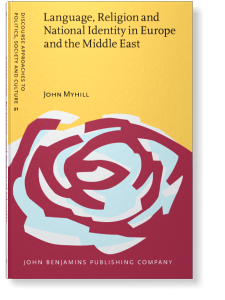Language, Religion and National Identity in Europe and the Middle East
A historical study
Author
This book discusses the historical record of the idea that language is associated with national identity, demonstrating that different applications of this idea have consistently produced certain types of results. Nationalist movements aimed at ‘unification’, based upon languages which vary greatly at the spoken level, e.g. German, Italian, Pan-Turkish and Arabic, have been associated with aggression, fascism and genocide, while those based upon relatively homogeneous spoken languages, e.g. Czech, Norwegian and Ukrainian, have resulted in national liberation and international stability. It is also shown that religion can be more important to national identity than language, but only for religious groups which were understood in premodern times to be national rather than universal or doctrinal, e.g. Jews, Armenians, Maronites, Serbs, Dutch and English; this is demonstrated with discussions of the Holocaust, the Armenian Genocide, the civil war in Lebanon and the breakup of Yugoslavia, the United Netherlands and the United Kingdom.
[Discourse Approaches to Politics, Society and Culture, 21] 2006. ix, 300 pp.
Publishing status: Available
© John Benjamins Publishing Company
Table of Contents
-
Acknowledgements | p. vii
-
Introduction | pp. 1–26
-
Premodern national churches, Roman Europe, and the Caliphate | pp. 27–70
-
Small languages and national liberation | pp. 71–117
-
Big languages, delusions of grandeur, war, and fascism | pp. 119–176
-
Language, religion, and nationalism in Europe | pp. 177–227
-
Language, religion, and nationalism in the Middle East | pp. 229–276
-
Conclusion | pp. 277–281
-
-
Index | pp. 295–300
“It should be stressed that this is an important work. Myhill compels us to look in a multidimensional way at the great identity conflicts and genocidal disasters of modernity, providing a challenging and provocative close reading of the evolution and interaction of a large number of ethnic and national groups.”
Christopher Hutton, The University of Hong Kong, in Language Vol. 85.1 (2009)
“It has always been clear that language is linked to nationalism and nationalism to language. What John Myhill has done here is to show for the first time that this easy equation ignores the linguistic facts. It may be true that a "language is a dialect with an army and a navy". But it is not just the army and the navy that matter. It also matters that some languages are more obviously languages than others.”
Peter Trudgill
“[...] the book will interest anyone who wants to read (or re-read) facts and data about European and Middle East nations in the light of the influence of language and religion, two main driving forces of the identity of human beings.”
Federico Gobbo, University of Insubria, Italy, in Language Problems and Language Planning, Vol. 32:2 (2008)
Cited by (20)
Cited by 20 other publications
Screti, Francesco
Hager, Anna
Laliberté, André
Omoush , Ma'en & Khaled Jboor
Gobbo, Federico & László Marácz
NARDELLA, Federica
Rubio, Clémentine & Karène Sanchez-Summerer
Dowling, Andrew
Tabachnik, Maxim
Tabachnik, Maxim
Tabachnik, Maxim
Zhou, Minglang
Sanchez Summerer, Karène
Sanchez-Summerer, Karène
Boer, Diana, Ronald Fischer, Ma Luisa González Atilano, Jimena de Garay Hernández, Luz Irene Moreno García, Socorro Mendoza, Valdiney V. Gouveia, Jason Lam & Eva Lo
Koutrelakos, James
Koutrelakos, James
This list is based on CrossRef data as of 18 july 2024. Please note that it may not be complete. Sources presented here have been supplied by the respective publishers. Any errors therein should be reported to them.
Subjects
Linguistics
Philosophy
Main BIC Subject
CF: Linguistics
Main BISAC Subject
LAN009000: LANGUAGE ARTS & DISCIPLINES / Linguistics / General
